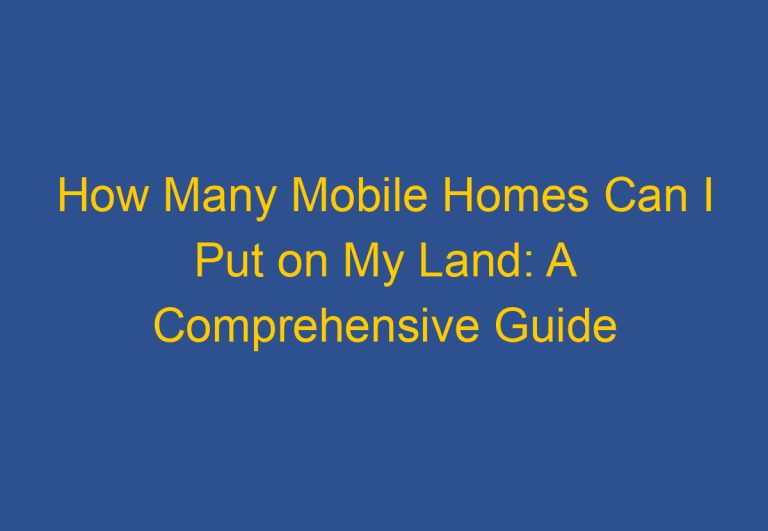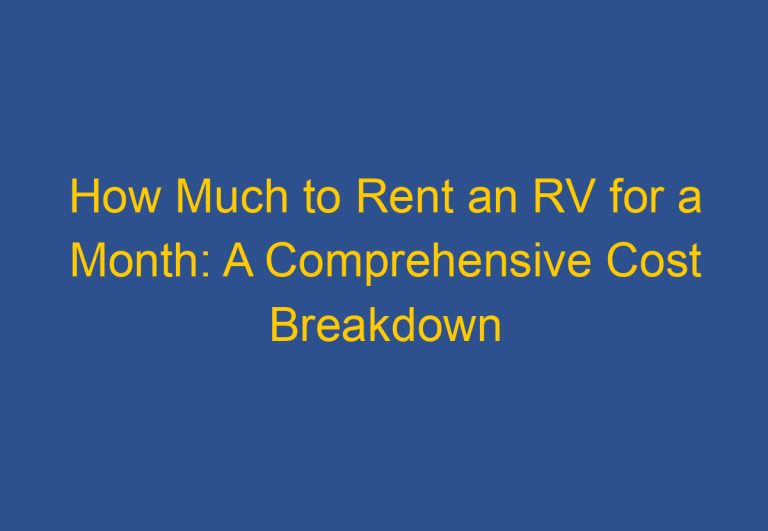How Much Does It Cost to Start a Trailer Park: A Comprehensive Guide
Starting a mobile home park can be a profitable business venture for those looking to invest in real estate. However, before diving into this type of investment, it is important to understand the costs associated with starting a trailer park. While the costs can vary depending on the size and location of the park, there are certain factors that can greatly impact the overall investment.
One of the major factors that can greatly impact the cost of starting a trailer park is the size of the land and infrastructure required for building the park. On average, the size of a trailer park should be between 2,000 to 5,000 square feet per lot. Additionally, the cost of purchasing land, developing the site, and marketing the park can range between $250,000 and $1,000,000. It is important to keep in mind that these are ballpark figures and the costs can vary depending on the location and other factors.
To ensure a profitable investment, it is important to develop a mobile home park business plan that includes a detailed financial analysis. This should include projected revenue, expenses, and profits over a period of time. By carefully considering all of the costs associated with starting a trailer park, investors can make informed decisions and create a successful business venture.
Initial Investments and Financial Planning
Starting a trailer park business requires a significant investment of time, money, and resources. Before embarking on this venture, it is essential to conduct a thorough analysis of the costs involved and develop a comprehensive financial plan. The following subsections will outline the primary areas of investment and financial planning that need to be considered.
Land Acquisition and Costs
One of the most significant expenses when starting a trailer park business is the cost of acquiring land. The price of land varies widely depending on the location, size, and zoning laws. It is important to conduct a thorough analysis of the local real estate market to find a suitable location that meets the needs of the business. Once the land has been identified, it is essential to negotiate a fair price and secure financing.
Design, Permits, and Zoning
Designing a trailer park requires careful planning and consideration of zoning laws and permits. It is important to work with a civil engineer and architect to develop a blueprint that meets local zoning laws and regulations. The design should include a layout that maximizes the use of space and provides adequate infrastructure and utilities. The cost of design and permits can vary widely depending on the location and complexity of the project.
Infrastructure and Development
Developing a trailer park requires significant investment in infrastructure and development. This includes the construction of roads, utilities, and buildings. It is important to work with a reliable contractor to ensure that the project is completed on time and within budget. The cost of infrastructure and development can vary widely depending on the size and complexity of the project.
Mobile Homes and Community Setup
The cost of mobile homes and community setup can vary widely depending on the size and number of units required. It is important to work with a reputable manufacturer to ensure that the homes meet local building codes and regulations. The community setup should include amenities such as a clubhouse, pool, and playground to attract residents.
Legal and Management Considerations
Starting a trailer park business requires careful consideration of legal and management issues. It is important to establish a legal structure for the business and obtain all necessary licenses and insurance. The management structure should include a dedicated manager or team to oversee the day-to-day operations of the park. The cost of legal and management considerations can vary widely depending on the complexity of the project.
Marketing and Growth Strategies
Marketing and growth strategies are essential for the success of a trailer park business. It is important to develop a marketing plan that targets the right audience and highlights the unique features of the park. This may include advertising in local newspapers, online directories, and social media. Growth strategies may include expanding the park or developing additional amenities to attract new residents.
In conclusion, starting a trailer park business requires careful planning and consideration of the costs involved. By developing a comprehensive financial plan and working with reliable partners, it is possible to create a successful and profitable business.
Operating Costs and Revenue Streams
Starting a trailer park requires a significant investment in time, money, and resources. Beyond the initial startup costs, there are ongoing expenses and fees that must be factored in to ensure the profitability of the business.
Ongoing Expenses and Fees
The ongoing expenses of a trailer park include management costs, utilities, maintenance, and licenses. Management costs include the salaries of employees, office expenses, and other overhead costs. Utilities include electricity, water, and sewage expenses. Maintenance costs include repairs, landscaping, and other upkeep expenses. Licenses are required by local and state governments and must be renewed annually.
Rent Collection and Profitability
Rent collection is the primary source of revenue for a trailer park. To ensure profitability, the rent must be set at a rate that covers the expenses and generates a profit. The rent should be competitive with other trailer parks in the area but should also reflect the amenities and services offered by the park.
Expansion and Diversification
Expansion and diversification are essential to the long-term profitability of a trailer park. This can include adding additional sites, adding amenities such as a pool or clubhouse, or diversifying the types of tenants by allowing tiny houses or other alternative housing options.
Investing in a trailer park can be a profitable real estate investment for investors who are willing to put in the time and effort to manage the property effectively. By understanding the ongoing expenses and fees, rent collection and profitability, and expansion and diversification opportunities, investors can make informed decisions about whether a trailer park is the right investment for them.
Frequently Asked Questions
What initial investments are required to open a mobile home park?
To open a mobile home park, there are several initial investments required. The cost of buying land, legal fees, water and sewerage treatment facilities, blueprints, and mobile homes are some of the expenses that one should expect. The total initial investment cost can range from $4.5 to $6 million for a 100-lot trailer park. However, it is important to note that these are ballpark figures and the costs may vary depending on the location of the park.
What are the potential profits from operating a mobile home park?
The potential profits from operating a mobile home park can be significant. The average monthly rent per lot is around $200 to $300, which can add up to a substantial amount of revenue for the park. Additionally, mobile home parks have lower maintenance costs compared to other types of rental properties, which can increase the profitability of the park.
What is the average cost per lot when developing a mobile home park?
The average cost per lot when developing a mobile home park can vary depending on the location and other factors. On average, the cost of buying a mobile home ranges between $37,000 and $75,000, and the cost of moving a mobile home ranges between $1,000 and $3,000. The cost of preparing land for a mobile home can range from $3,500 to $25,000, and some even $40,000. It is important to consider all of these factors when determining the average cost per lot.
How can one finance the purchase of a mobile home park?
One can finance the purchase of a mobile home park through various means. Some options include traditional bank loans, private financing, or seller financing. It is important to research and compare different financing options to find the best fit for one’s financial situation.
What are common challenges when managing a mobile home park?
Managing a mobile home park can come with its own set of challenges. Some common challenges include maintaining the park’s infrastructure, dealing with tenant issues, and complying with local regulations. However, with proper planning and management, these challenges can be minimized.
What steps should be taken to start a mobile home park in a specific state?
To start a mobile home park in a specific state, one should research and comply with all local and state regulations. This may include obtaining necessary permits and licenses, complying with zoning laws, and meeting health and safety standards. Additionally, it is important to develop a comprehensive business plan, secure financing, and find a suitable location for the park.










